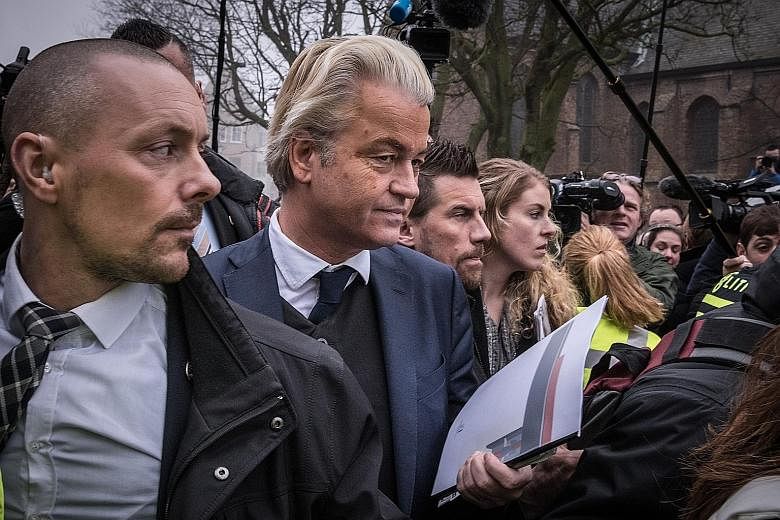AMSTERDAM • The parochial world of Dutch elections is not often seen as a hotbed of foreign intrigue.
But in recent months, an unexpected worry has emerged: the influence of American money.
The country's fast-rising far-right leader, Mr Geert Wilders, is getting help from American conservatives attracted to his anti-European Union (EU) and anti-Islam views.
Mr David Horowitz, a United States right-wing activist, has contributed roughly US$150,000 (S$212,000) to Mr Wilders' Party for Freedom over two years.
Nearly US$120,000 of that amount came in 2015, making it the largest individual campaign contribution in the Dutch political system that year, according to recently released records.
-
Guide to Dutch politics
-
THE HAGUE • Twenty-eight parties and 1,114 candidates, the highest number since World War II, will compete in the Dutch elections next Wednesday, chasing 150 seats in the Lower House of Parliament.
In this system of proportional representation, even the smallest parties can play an outsize role as kingmakers in building a 76-seat majority.
Here is a guide for navigating the alphabet soup of Dutch politics. The polling figures are from Peilingwijzer, an aggregate of six surveys.
People's Party for Freedom and Democracy (VVD): Led by Prime Minister Mark Rutte, it leans towards the right on the economy but is more progressive on social issues.
Campaign slogan: "Act. Normally"
Poll position: First, with 23 to 27 seatsParty for Freedom (PVV): The far-right, anti- Islam and anti-European Union party is led by outspoken MP Geert Wilders. The party is officially an association with just one member - Mr Wilders.
Campaign slogan: "Reclaim The Netherlands For Us"
Poll position: Second, with 21 to 25 seatsChristian Democratic Appeal (CDA): Led by Mr Sybrand Buma, this centrist party was founded in 1980. It has long held an important place in Dutch politics but as the country has become more secular, support has waned.
Campaign slogan: "Choice for a better Netherlands"
Poll position: Third, with 18 to 20 seatsD66: Progressive and pro-European, the party is led by Mr Alexander Pechtold and was founded in 1966.
Campaign slogan: "Together Stronger. Chances for Everyone"
Poll position: Fourth, with 17 to 19 seatsGreenLeft: Founded in 1990, the party is led by Mr Jesse Klaver, who is at 30 the country's youngest party leader.
Campaign slogan: "Time For Change"
Poll position: Fifth, with 16 to 18 seatsSocialist Party: Founded in 1972, the Socialist Party is anti-EU.
Campaign slogan: "Seize the Power"
Poll position: Sixth, with 13 to 15 seatsLabour Party: Founded in 1946, it is the junior party in the outgoing coalition.
Campaign slogan: "Forward Together".
Poll position: Seventh, with 11 to 13 seats .Reformed Political Party: Founded in 1918, it did not admit female members until 2006. It is against abortion and euthanasia.
Poll position: Could win three to five seats.Christian Union (CU): May also take five to seven seats.
50+: The party for the over-50s. Could boost its seats to between four and six.
Animal Party: Founded in 2002, it works for animal rights. May take four to six seats.
Denk: Founded in 2015 by immigrants. Drawing increasing support from the Turkish and Moroccan communities. May take up to two seats.
AGENCE FRANCE-PRESSE
By US standards, the amount is a pittance. But to some Dutch, who are already fearful of possible Russian meddling in the election, the American involvement is an assault on national sovereignty.
"It's foreign interference in our democracy," said Mr Ronald van Raak, a senior Member of Parliament in the opposition Socialist Party who has co-sponsored legislation to ban foreign donations.
"We would not have thought that people from other countries would have been interested in our politics," he added. "Maybe we underestimated ourselves."
The Dutch parliamentary elections on March 15 are the kick-off for a pivotal political year in Europe.
Other elections loom in France, Germany and possibly Italy.
With the viability of the EU at stake, anxiety is rising about foreign interference, with European intelligence agencies warning that Russia is working to help far-right parties through hacking and disinformation campaigns.
But sympathy for Europe's far right is also coming from Americans who share similar views and are willing to contribute money to help the cause.
Measuring this outside support is difficult, though, because many European countries have leaky, opaque accountability systems on campaign finance.
While France bars contributions from businesses, loans are allowed. A Russian bank made headlines in recent years after lending millions of euros to the far-right National Front party of Ms Marine Le Pen.
After that bank failed last year, the party complained that it had been shunned by French banks and declared itself in the market for a new lender.
If nothing else, European far-right parties are gaining newly emboldened allies.
"I expect the Trump administration to be more open to these parties than Obama, certainly," said Representative Steve King, an Iowa Republican, who is an ally both of US President Donald Trump and the European far right, having met with various party leaders during a recent European trip.
The US State Department declined "to comment on political parties in foreign elections".
Mr Horowitz, who has called Islam "a sick death cult", first rallied to Mr Wilders' side after the Dutch politician was put on trial in 2010 for inciting hatred against Muslims with a film he made that attacked the Quran. He was acquitted the following year.
Mr Wilders was more recently found guilty of incitement after leading an anti-Moroccan chant at a rally, though he avoided a fine.
"I think he's the Paul Revere of Europe," Mr Horowitz said in an interview. "Geert Wilders is a hero, and I think he's a hero of the most important battle of our times, the battle to defend free speech," he added, calling the situation in Europe a "nightmare".
NYTIMES

